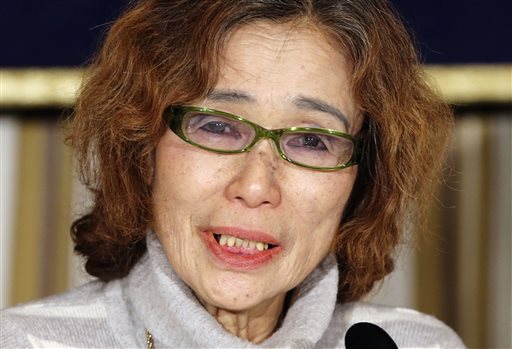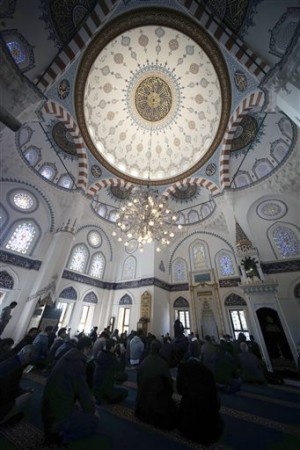A mother appeals to Isis to free 2 Japanese men

Junko Ishido, mother of Japanese journalist Kenji Goto who was taken hostage by the Islamic State group, speaks during a press conference in Tokyo, Friday, Jan. 23, 2015. AP
TOKYO—The deadline set by Islamist militants threatening to kill two Japanese men unless they were given $200 million passed on Friday, after one captive’s mother made a desperate plea to save her son’s life.
Japan had heard nothing from the extremists holding Kenji Goto, a freelance journalist, or Haruna Yukawa, the self-employed contractor who he had gone to rescue, the chief government spokesperson said.
Hours earlier, Junko Ishido launched an emotional appeal for mercy for Goto, her son.
“I say to you people of the Islamic State, Kenji is not your enemy. Please release him,” she said.
“Kenji was always saying ‘I hope to save lives of children on battlefields.’ He was reporting war from a neutral position.”
Article continues after this advertisement“There has been no message” from the Islamic State (IS) group since the 72-hour deadline expired at 2:50 p.m. (1:50 p.m., Manila time) Friday, Yoshihide Suga told reporters.
Article continues after this advertisement“The situation remains very severe, but the government is making its utmost efforts, asking for cooperation from many countries and heads of ethnic groups.”
Reporters waiting for any announcement on the two men’s fate said Prime Minister Shinzo Abe looked tired and drawn as he rushed from one commitment to the next.
Yukawa, aged around 42 and who dreamed of becoming a military contractor, was captured in August outside the Syrian city of Aleppo.
Goto, 47, a war correspondent with experience in Middle East hot spots, went to Syria in late October to try to help Yukawa.

Muslims residing in Japan offer Friday prayers at Tokyo Camii, the largest mosque in Japan, in Tokyo, Friday, Jan. 23, 2015. AP
High drama
The high drama comes three days after the sudden release by the IS of a video in which Goto and Yukawa, apparently kneeling in the desert, are threatened with execution by a British-accented man.
“You now have 72 hours to pressure your government into making a wise decision by paying the $200 million to save the lives of your citizens,” the man said.
The Islamists linked the ransom to the amount of cash Abe said he would be earmarking to help countries dealing with the influx of refugees fleeing fighting between IS and regular forces.
Asked by a journalist if she thought Tokyo should pay the ransom, as it had in previous hostage situations, Ishido said: “Yes, I very much hope so.”
“Japan has maintained a friendly relationship with Islamic nations.
“The time remaining is scarce. I beg you Japanese government officials, please save Kenji’s life.”
Tokyo is under pressure from Britain and the United States to stand firm on the ransom, as both countries have a policy of never paying ransoms.
Ishido, who was identified as Goto’s birth mother, said she learned on Thursday that his wife had given birth two weeks ago when the two spoke on the telephone for the first time.
Gentle heart
“Kenji left for the IS with a gentle heart hoping to save a life of his Japanese colleague,” she said, referring to reports that Goto had been on a mercy mission to rescue Yukawa.
“He didn’t care about his safety because he believed he and people of IS would be able to understand each other, as members of the global community.”
She also said she had no contact at all with the Japanese government since a video of Goto and Yukawa emerged on Tuesday.
A spokesperson told Agence France-Presse the administration was in close contact with the families of the missing men, but refused to elaborate.
‘Infidels vs Islamic State’
NHK reported early Friday it had a text and audio exchange with a “public relations” official from the Islamic State group.
The representative was quoted as saying: “Japanese are infidels fighting against Islamic State.”
Asked about the Japanese efforts to negotiate the release of the two hostages, the representative said: “A statement will come out sometime later.”
The Japanese media have rallied around Goto, a respected and experienced war reporter whose work has appeared on domestic television channels.
In a video footage he filmed around the time he entered Syria, he holds identification papers and his Japanese passport and explains that he is aware of the risks.
‘I am responsible’
“Whatever happens, I am the one who is responsible,” he says. “I am asking you, Japanese people, do not place responsibility on the people of Syria. Please. I am sure I will come back alive though.”
The IS group has previously killed three Americans and two Britons after parading them on camera, but this is the first time Japanese citizens have been threatened, and the first time a ransom demand has been made in this way.
According to a briefing document reviewed by Reuters, Abe’s government considered whether planned legislative changes would give it the legal basis for a military strike on the IS militants and concluded it did not.
The capture of the two Japanese citizens represents an “unacceptable act of terror,” the document said.
But it concluded the situation would not meet the legal conditions for the dispatch of Japanese forces, whose activities abroad are constrained by the pacifist, postwar constitution, even under planned changes to the current interpretation of the charter.
Won’t bow to terror
In an online video released on Tuesday, a black-clad figure holding a knife stood between Goto and Yukawa, threatening to kill them if Tokyo did not pay $200 million within 72 hours.
Abe has said saving the men’s lives is paramount but that Japan will not bow to terrorism.
Japanese officials have declined to say if they would pay any ransom, a move that would put Tokyo at odds with close ally, the United States.
Abe has ordered his government to make every effort to secure the hostages’ safe release, setting off a flurry of activity among Japanese diplomats.
However, sources familiar with the matter said Japanese diplomats had told the families of the two captives prior to the video’s release that no ransom would be paid.
For humanitarian aid
The captor in the video, which resembles those showing previous Islamic State captives, said the ransom demand matched the $200 million in aid that Abe pledged to help countries fighting Islamist militants.
Abe made the pledge during a multination visit to the Middle East earlier this month. Islamic State militants have seized large areas of Iraq and Syria.
Japan has stressed that its donation is for humanitarian aid, such as helping refugees, and insisted that it will not bow to terrorist threats.
In an address on Friday, prayers at Tokyo’s most prominent mosque, the Tokyo Camii and Turkish Culture Center, the imam, Muhammad Rashid Alas, called for the “immediate release of the two Japanese hostages,” quoting from the Koran on the need to show mercy.
Test for Abe
The center earlier posted a statement saying Islamic State’s actions were “totally against Islam and have a serious impact on Muslim communities all over the world and put Muslims in a precarious position.”
Abe’s handling of the hostage crisis—he must appear firm but not callous—will be a big test for the 60-year-old leader, but he appears to have few options.
Few Japanese are likely to blame Abe if the two captives are killed, but there could be questions raised over why he singled out countries battling the IS for the aid when it was known the group was holding two Japanese nationals. With a report from AFP
RELATED STORIES
Japan faces deadline to free Islamic State hostages
Japan’s Abe ‘fighting against time’ seeking to free hostages